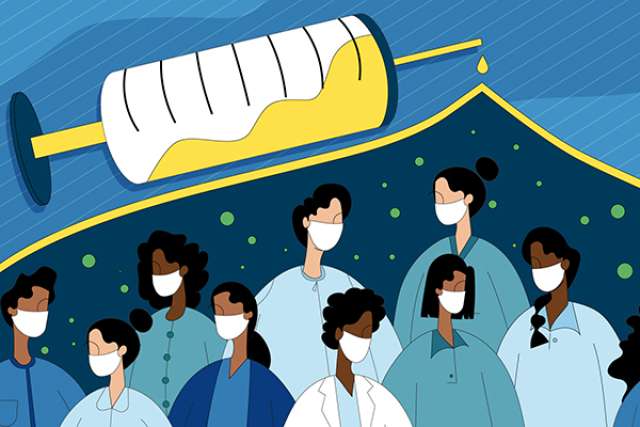UCLA administrative and medical leaders provided updated COVID-19 vaccination information and answered faculty and staff questions at an hour-long town hall with nearly 2,000 viewers on Wednesday, Jan. 28. The event was the third town hall, including one for students, UCLA has offered this month to address the rollout of the vaccines.
"We're beginning to see the light at the end of a really long tunnel," UCLA Chancellor Gene Block said. "Mass vaccinations obviously are going to be the key to pulling out of this." Block thanked UCLA Health personnel for their extraordinary efforts to vaccinate and educate people and affirmed that UCLA will offer the vaccine free of charge to all students, faculty and staff. Block, like the medical experts at the event, strongly encouraged members of the Bruin community to get the vaccine at their earliest opportunity.
Among the highlights:
Both of the currently approved vaccines — one developed by Moderna and the other by Pfizer — have proven to be highly effective in combatting COVID-19 across demographic and age groups.
Dr. Annabelle De St. Maurice, co-chief infection prevention officer and assistant professor of pediatrics in the division of infectious diseases at UCLA Health, said that there is no evidence that the vaccines are unsafe for pregnant women, but noted that testing among pregnant women is expected to begin in earnest in the coming weeks and months. She urged pregnant women to consult their physicians about taking the vaccine. Testing among children as young as 12 will begin this summer, she said.
Vaccines developed using mRNA technology, which these two are, cannot cause a COVID-19 infection, nor can the vaccine alter a person's DNA.
Dr. Dan Uslan, a specialist in infectious diseases and co-chief infection prevention officer and clinical chief of infectious diseases at UCLA Health, explained that the Moderna and Pfizer vaccines are not the common type of vaccine that contain small doses of a live virus.
The overwhelming majority of vaccine recipients thus far report no side effects or mild ones.
The medical experts said that those mild side effects include muscle soreness, fatigue or headaches.
Bill Dunne, UCLA Health’s administrative director for emergency preparedness, safety and security services, addressed the Los Angeles County Department of Public Health's planned rollout of the vaccine to the community. Vaccine providers in Los Angeles County have largely completed offering vaccinations to medical personnel, and are now offering the vaccine to everyone 65 or older. The next phases will include those at risk of exposure while at work, a category that at UCLA includes on-site workers in transportation, housing, food service, grounds maintenance and related occupations, as well as instructors offering the in-person courses, lab researchers, teachers and support staff for pre-K students. UCLA students and workers who do not fall into higher-risk categories would come in subsequent phases.
It would be premature to place a timeline on the upcoming phases.
"We are still working through the allocation process to get more vaccine, and that's really been our most challenging process at this point," Dunne said. "We have a lot of ability to get people vaccinated; we just don't have enough vaccine to do that so far."
The event was moderated by Michael Beck, administrative vice chancellor, and Michael Meranze, professor and immediate past chair of the academic senate, who serve as co-chairs of UCLA's COVID-19 Response and Recovery Task Force. The town hall also addressed other topics, including how individuals can schedule appointments once they are contacted by UCLA Health.



